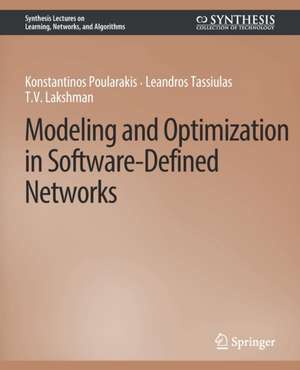Modeling and Optimization in Software-Defined Networks: Synthesis Lectures on Learning, Networks, and Algorithms
Autor Konstantinos Poularakis, Leandros Tassiulas, T.V. Lakshmanen Limba Engleză Paperback – oct 2021
Din seria Synthesis Lectures on Learning, Networks, and Algorithms
- 20%
 Preț: 323.00 lei
Preț: 323.00 lei - 20%
 Preț: 638.55 lei
Preț: 638.55 lei - 20%
 Preț: 273.49 lei
Preț: 273.49 lei - 20%
 Preț: 302.41 lei
Preț: 302.41 lei - 20%
 Preț: 336.95 lei
Preț: 336.95 lei - 20%
 Preț: 327.12 lei
Preț: 327.12 lei - 20%
 Preț: 355.11 lei
Preț: 355.11 lei - 20%
 Preț: 328.09 lei
Preț: 328.09 lei - 20%
 Preț: 210.63 lei
Preț: 210.63 lei - 20%
 Preț: 273.82 lei
Preț: 273.82 lei - 20%
 Preț: 331.25 lei
Preț: 331.25 lei - 20%
 Preț: 163.24 lei
Preț: 163.24 lei - 20%
 Preț: 173.58 lei
Preț: 173.58 lei - 20%
 Preț: 199.72 lei
Preț: 199.72 lei - 20%
 Preț: 199.72 lei
Preț: 199.72 lei - 20%
 Preț: 417.11 lei
Preț: 417.11 lei - 20%
 Preț: 298.43 lei
Preț: 298.43 lei - 20%
 Preț: 199.72 lei
Preț: 199.72 lei - 20%
 Preț: 227.81 lei
Preț: 227.81 lei - 20%
 Preț: 226.14 lei
Preț: 226.14 lei - 20%
 Preț: 331.74 lei
Preț: 331.74 lei - 20%
 Preț: 163.24 lei
Preț: 163.24 lei - 20%
 Preț: 226.64 lei
Preț: 226.64 lei - 20%
 Preț: 475.02 lei
Preț: 475.02 lei - 20%
 Preț: 296.47 lei
Preț: 296.47 lei - 20%
 Preț: 314.91 lei
Preț: 314.91 lei - 20%
 Preț: 199.72 lei
Preț: 199.72 lei - 20%
 Preț: 181.10 lei
Preț: 181.10 lei - 20%
 Preț: 224.97 lei
Preț: 224.97 lei - 20%
 Preț: 243.57 lei
Preț: 243.57 lei
Preț: 357.06 lei
Preț vechi: 446.32 lei
-20% Nou
Puncte Express: 536
Preț estimativ în valută:
68.33€ • 73.06$ • 56.97£
68.33€ • 73.06$ • 56.97£
Carte tipărită la comandă
Livrare economică 17 aprilie-01 mai
Preluare comenzi: 021 569.72.76
Specificații
ISBN-13: 9783031012549
ISBN-10: 3031012542
Pagini: 160
Ilustrații: XIV, 160 p.
Dimensiuni: 191 x 235 mm
Greutate: 0.31 kg
Editura: Springer International Publishing
Colecția Springer
Seria Synthesis Lectures on Learning, Networks, and Algorithms
Locul publicării:Cham, Switzerland
ISBN-10: 3031012542
Pagini: 160
Ilustrații: XIV, 160 p.
Dimensiuni: 191 x 235 mm
Greutate: 0.31 kg
Editura: Springer International Publishing
Colecția Springer
Seria Synthesis Lectures on Learning, Networks, and Algorithms
Locul publicării:Cham, Switzerland
Cuprins
Preface.- Acknowledgments.- Introduction.- SDN Control Plane Optimization.- SDN Data Plane Optimization.- Future Research Directions.- Bibliography.- Authors' Biographies.
Notă biografică
Konstantinos Poularakis is a Research Scientist at Yale University. His research interests lie in the area of network optimization and machine learning with emphasis on emerging architectures such as software-defined networks, mobile edge computing, and caching networks. His research has been recognized by several awards and scholarships from sources including the Greek State Scholarships foundation (2011), the Center for Research and Technology Hellas (2012), the Alexander S. Onassis Public Benefit Foundation (2013), and the Bodossaki Foundation (2016). He also received the Best Paper Award at the IEEE Infocom 2017 and IEEE ICC 2019 conferences. Konstantinos obtained his Diploma, M.S., and Ph.D. degrees in Electrical Engineering from the University of Thessaly, Greece, in 2011, 2013, and 2016 respectively. In 2014, he was a Research Intern with Technicolor Research, Paris.Leandros Tassiulas is the John C. Malone Professor of Electrical Engineering at Yale University. His research interests are in the field of computer and communication networks with emphasis on fundamental mathematical models and algorithms of complex networks, architectures, and protocols of wireless systems, sensor networks, novel internet architectures, and experimental platforms for network research. His most notable contributions include the max-weight scheduling algorithm and the back-pressure network control policy, opportunistic scheduling in wireless, the maximum lifetime approach for wireless network energy management, and the consideration of joint access control and antenna transmission management in multiple antenna wireless systems. Dr. Tassiulas is a Fellow of IEEE (2007) and the ACM (2020). His research has been recognized by several awards including the IEEE Koji 160 AUTHORS’ BIOGRAPHIES Kobayashi Computer and Communications Award (2016), the ACM SIGMETRICS Achievement Award 2020, the inaugural INFOCOM 2007 Achievement Award “for fundamental contributions to resource allocation incommunication networks,” several best paper awards including the at INFOCOM 1994, and 2017 and Mobihoc 2016, a National Science Foundation (NSF) Research Initiation Award (1992), an NSF CAREER Award (1995), an Office of Naval Research Young Investigator Award (1997), and a Bodossaki Foundation Award (1999). He holds a Ph.D. in Electrical Engineering from the University of Maryland, College Park (1991) and a Diploma in Electrical Engineering from Aristotle University of Thessaloniki (1987). He has held faculty positions at Polytechnic University, New York, University of Maryland, College Park, and University of Thessaly, and University of Ioannina, Greece.
T.V. Lakshman is the Head of the Networks Research Group, Nokia Bell Laboratories. His research contributions to networking span a spectrum of topics, including software-defined networking, traffic management, switch architectures, network optimization, TCP performance, and machine-learning applications to networks. He is a recipient of several IEEE and ACM awards, including the IEEE Leonard Abraham Prize, the IEEE Communication Society William R. Bennett Prize, the IEEE INFOCOM Achievement Award, the IEEE Fred W. Ellersick Prize Paper Award, the ACM SIGMETRICS Best Paper Award, and the IEEE Infocom Best Paper Award. He also received the 2010 Thomas Alva Edison Patent Award from the R&D Council of New Jersey. He has been an Editor of the IEEE/ACM Transactions on Networking and the IEEE Transactions on Mobile Computing. He is a Fellow of IEEE, ACM, and Bell Labs. He received the Master’s degree (Physics) from the Indian Institute of Science, Bengaluru, India, and the M.S. and Ph.D. degrees in Computer Science from the University of Maryland, College Park.
